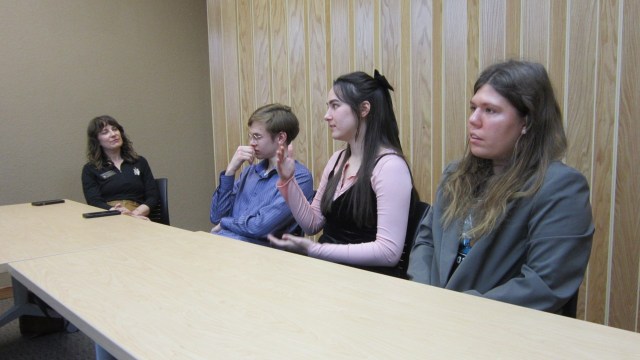Not all vodka is intended for consumption, as highlighted by three Russian students from Northeastern Junior College. These students engaged with Sterling residents on a Monday to share insights about their homeland and experiences in the United States. The interaction occurred at the weekly gathering of Coffee, Tea, and We, a discussion group hosted at the Colorado State University Engagement Center.
Part of a diverse group of 41 individuals from 20 different countries studying at NJC, these Russian students are participants in the Eurasia Foundation program. Sarah Stone-Robinson, the International Student Coordinator at NJC, noted that unlike typical exchange students who align their coursework with their university programs, the Eurasia students have chosen to explore subjects outside their primary fields of study in Russia.
Artem Khromov, originally from Moscow and an English language major, is currently immersing himself in business studies in Sterling. His ultimate goal is to leverage his English proficiency by teaching it as a second language in Russia.
Anastasia Makachirova, from a city in Siberia with a population exceeding 500,000, is studying philology in Russia while exploring art at NJC. Philology involves the analysis of language structures, historical evolution, and linguistic connections.
Elizaveta Polovinkina, a native of St. Petersburg, is pursuing a degree in urbanization in Russia but is focusing on business studies during her U.S. stay.
While expanding their academic horizons beyond their majors, the students are primarily interested in gaining deeper insights into American culture. Along the way, they have encountered both surprising and occasionally challenging aspects of life in the U.S.
For example, the students had the opportunity to meet local descendants of the Wolkadeutsch, ethnic Germans who initially settled in Russia in the 1760s before moving to the U.S. Makachirova expressed delight in discovering the history of these Germans from Russia who formed communities in the American Midwest.
On a different note, Khromov found it peculiar to see students wearing baseball caps indoors, a practice less common in Europe where removing headgear indoors is customary.
Polovinkina, despite coming from Russia’s second-largest city, shared that she spent a significant part of her childhood in small towns with relatives. She prefers staying with host families during travels as it offers a more authentic glimpse into American life.
In addition to missing their families, the students long for familiar Russian cuisine such as rich, dark rye bread and kasha, a hearty porridge typically made from buckwheat or oats, commonly eaten for breakfast or lunch in Russia.
Although proficient in English, the students have had to adjust linguistically in Sterling, where American English differs from the British variant they were taught. Khromov compiled a list of American slang terms, finding expressions like “badass” both amusing and puzzling.
During breaks from their NJC studies, the students explore various states across the U.S. Makachirova, who has visited 14 states, particularly enjoyed Oregon and northern California for their lush, rainy forests reminiscent of her homeland in southern Siberia.
Upon completing their studies in May, the students will return to Russia. While they value their time in the U.S., they eagerly anticipate reuniting with their families and homeland.
Regarding vodka, a quintessential Russian spirit, the students clarified that while it is a common household item in Russia, it is not primarily consumed. Khromov explained that vodka is often used to disinfect minor wounds due to its affordability and effectiveness as an antiseptic, serving as a cost-effective alternative to store-bought options.
